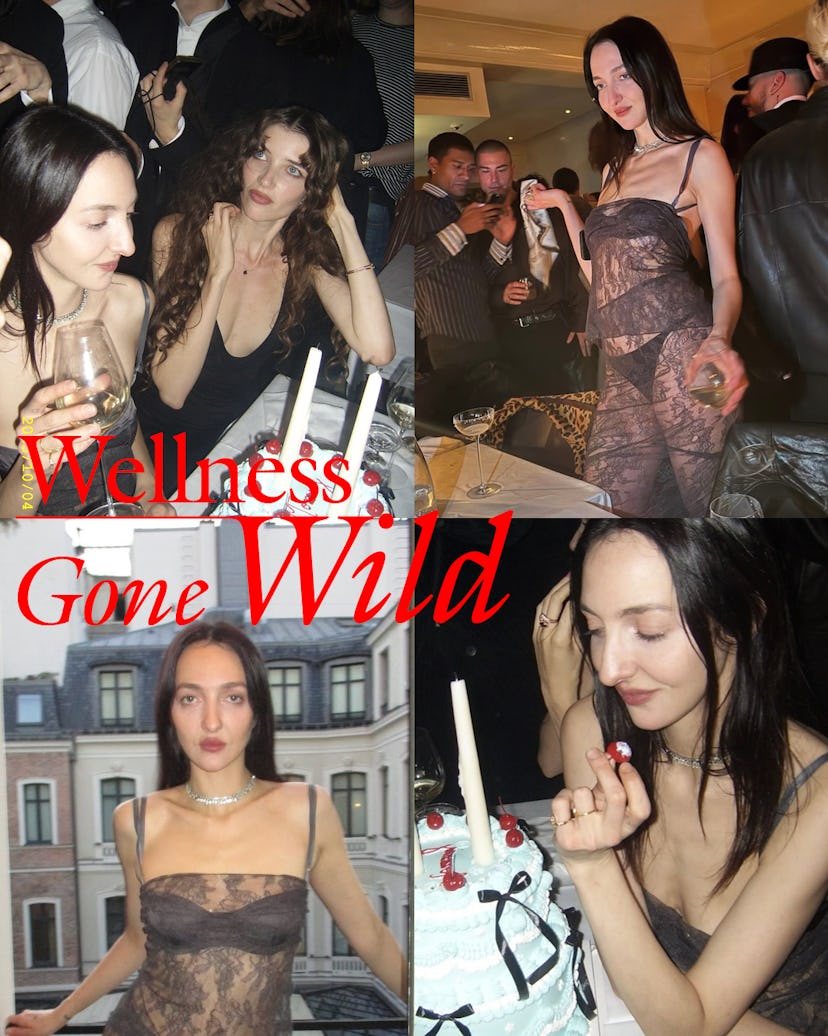From the trenches of Fashion Month to the front lines of Frieze London, I’ve spent the last few weeks attending the opening of an email, which means drinking copious amounts of white wine. (If you read my last piece, you know I’m allegedly allergic to it.) To make matters worse, I turned 35 slap bang in the middle of it all. I celebrated, or commiserated, by poisoning my liver even further. All of which is to say, I've been hungover for about a month now.
I used to roll my eyes at anyone who abstained from drinking because they could no longer deal with a hangover. But as I hurtle towards my late 30s, I’m starting to get what the Karens have been droning on about. Indeed, waking up with a dry mouth and a skull-crushing, brain-throbbing headache, potentially still seasick from the room spinning the night before, really isn't pleasant, especially as I get older. Or rather, especially as my children get older and become wise to the fact that Mummy isn't feeling so fresh.
If only there were some special pill, potion, or powder that could help alleviate the effects of a hangover. Or better yet, prevent one from happening entirely. Enter: Dihydromyricetin, or DHM. While it sounds like the kind of substance that will make you profoundly hungover, it, allegedly, prevents one. Derived from the Japanese Raisin Tree, the supplement has been used for centuries in traditional East Asian medicine to detoxify and support the liver. Fast-forward to today, and it would seem the Western world—and TikTok—is taking note. A host of buzzy wellness brands like Myrkl, Wonky, and Nature’s Craft are now touting DHM as a new natural hangover cure.
Japanese raisin tree engraving by Weddell, 1822
As we all like to ignore, alcohol is actually very bad for you. “It’s a poison,” the viral French biochemist Jessie Inchauspé, AKA the Glucose Goddess, tells me. Your body desperately tries to get rid of alcohol by converting it into acetaldehyde—which is highly toxic—and then, eventually, into acetic acid. However, “while your liver is working away, acetaldehyde hangs out in your body and brain, doing damage,” explains Inchauspé. Here’s where DHM steps in—though it’s according to studies done on animals, not humans. Thanks to its purported anti-inflammatory and antioxidative properties, DHM might help the body process acetaldehyde. Or, as Inchauspé puts it, DHM could “protect [the liver] from damage and reduce alcohol-induced inflammation.” It also possibly helps restore your GABA-A receptors, the things that cause rapid inhibition within the nervous system, which are impaired on a boozy night out. “The more you drink, the more [they] get overstimulated and that’s when coordination drops, speech slurs, and judgment fades. DHM seems to work by gently turning those same switches back down.”
Big if true, as the kids say. But is it true?
Despite trending earlier this year on TikTok, with hordes of self-described holistic health experts and competitive drinkers alike taking to the platform to boast about the supplement’s seemingly magical healing properties, DHM is not recognized by any official medical or government body. Regardless, I wanted to try it out for myself. So, after consulting various pseudoscience listicles, reading up on all the different DHM brands popular on TikTok, and yes, checking with an AI doctor (forgive me for my sins), I settled on a pack of Recover from a British brand called Anianhao. Bolstered with DHM, cysteine, milk thistle, and vitamin B, these supplements were advertised online as an "after-drinking support… specially formulated for excessive drinkers.” Just take three pills after your last alcoholic beverage and hope for the best.
They arrived within two days, just in time for the weekend. I’d been invited to a party that Saturday, which felt like the perfect time to try them out. That night, I stimulated my GABA-A receptors with about five glasses of pink champagne. I got home at around 1 a.m. and dutifully gobbled down my pills with water. Four hours later, I was up in the night needing to pee, but was surprised to discover there was no raging headache. I’m cured! After dozing for another couple of hours, I woke up to the dulcet sounds of my kids calling my name. But again, no headache.
Activating GABA-A receptors with Alex Consani at W Magazine and Cartier's Paris Fashion Week dinner.
However, that’s where the good news ends. I still felt tired, groggy, and thirsty. But I didn't want to kill myself, so that was great.
Yes, there was no headache, but I didn’t feel good. The main benefit of this experiment was being conscious about my alcohol consumption. Instead of mindlessly accepting refills and swearing off water, for the first time in probably 20 years of drinking, I actively paced myself, making sure to wash each glass of fizz down with a glass of water because I knew I’d be writing about my impending hangover the very next day. That must have contributed positively to how I felt the morning after. I’m not going to write DHM off entirely, but let me come back to you once the festive season is underway.
Editor’s Note: The information provided in this article is for entertainment and informational purposes only and should not be taken as medical advice. DHM is not approved by the FDA for the treatment or prevention of hangovers. Please drink responsibly.
